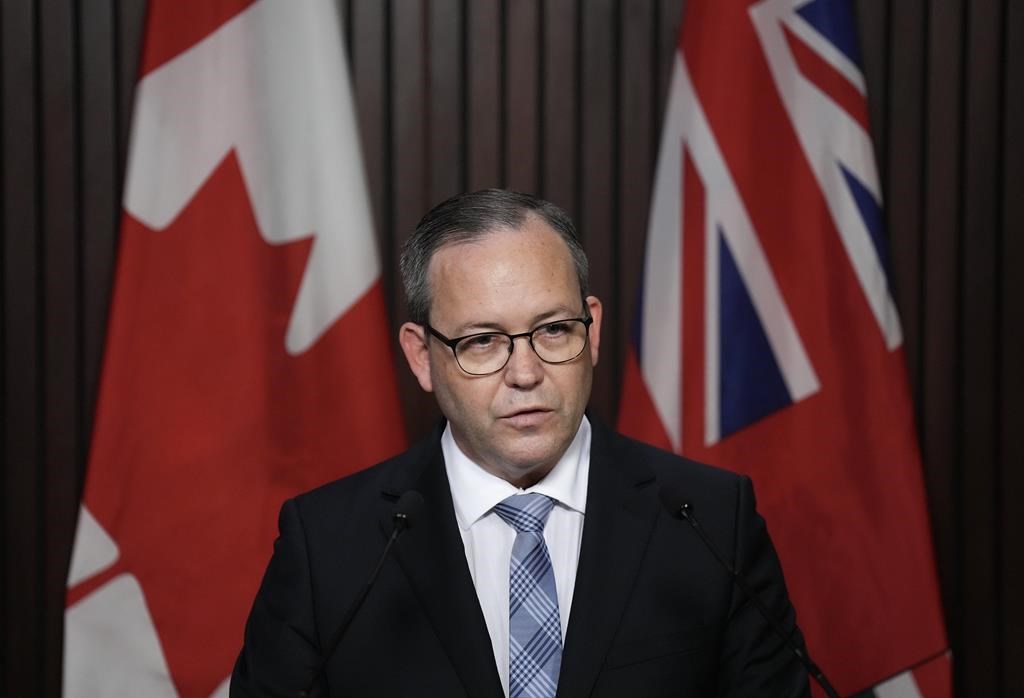TORONTO — Ontario intends to do away with mandatory coroner’s inquests for workers who died on construction sites, the government said Thursday.

Instead, the province will conduct an annual review of construction site deaths in an effort to alleviate pressure on overloaded coroners and to give answers to families sooner, Solicitor General Michael Kerzner said.
Inquests of all kinds usually take years from the time of deaths until they are conducted, and similar deaths are often examined together.
The changes are part of a new omnibus justice bill the province tabled Thursday. Kerzner said it’s an effort to speed up the inquest system.
“This lengthy process may not identify overarching health and safety trends and construction that could contribute to such deaths,” he said.
“With this act, the new changes would require construction-based deaths to be subject to a coroner-led mandatory review at least once a year.”
Families and the construction industry can still ask for an inquest by the Office of the Chief Coroner, which has the discretion to call one.
“The proposed amendments would lead to a broader systemic examination of safety issues in construction and would produce more sector-relevant recommendations faster,” Kerzner said.
Times have changed significantly in the construction industry, with a stronger focus on health and safety now compared to 50 years ago when inquests on these types of deaths became mandatory, said Chief Coroner Dirk Huyer.
Coroners will lead the annual reviews and will also bring forth recommendations, something a jury usually does at inquests.
- TSX flat as oil falls, U.S. stock markets mixed after Fed holds interest rates steady
- Panthers head back to work, resting and waiting for Bruins-Leafs winner
- Proline bettors still solidly behind Toronto Maple Leafs in NHL playoffs
- Ontario introduces sped-up apprenticeship path for high school students
The reviews will involve a number of people, including families and those in the construction industry.
About 40 per cent of construction site deaths over the last five years are falls from heights, Huyer said.
“What we’ve seen is that they’re treated as an individual circumstance as opposed to, if you brought those 40 per cent of deaths together, we could see trends and patterns,” Huyer said.
Coroners will still investigate each death on a construction site and families will be involved from the start of that process, he said.
“We think it will be more efficient, we think it’ll be more effective and we think it’ll be more informed,” he said. “And it will be earlier than an inquest would occur.”
The annual reviews will be made public six months later, Huyer said.
There are usually between 20 and 30 deaths at construction sites every year, he said. They represent about a third of mandatory inquests. Deaths in correctional facilities and deaths involving police represent a third each for mandated inquests.
Nixing mandated inquests on construction-site deaths will “absolutely” speed up the process to deal with other inquests, he said.
New Democrat justice critic Kristyn Wong-Tame criticized the government’s move.
“I am perplexed and very much confused as to why the government is asking for less oversight on the deaths of workers,” Wong-Tam said.
“I don’t see how this change in the Coroner’s Act would actually provide more access to justice.”
The government is also putting forward legislation that would make it easier for victims of crimes to sue their offenders for emotional distress, Attorney General Doug Downey said Thursday.
“They would do this by not forcing victims of crime to prove their distress in the civil court system,” Downey said.
The province is adding more crimes that victims can sue offenders over, including acts of terrorism, human trafficking offences and hate-related crimes targeting places of worship.
The changes for victims are commendable, said personal-injury lawyer Mike Smitiuch.
“I am always in favour of fewer obstacles and delays in the court system, especially when it comes to victims of horrific events and crimes,” he said.
“So, from that standpoint not requiring testimony on how an individual has been traumatized is a very good move.”
Downey said the changes would expedite cases through the system, which in turn will help tackle the notorious backlog in civil courts.
But Smitiuch said the change will “have no material effect” on the backlog.
The government’s bill would also allow firefighters to issue fines for certain violations, akin to parking tickets.
The province also intends to make it illegal to grow recreational cannabis in homes that offer daycare services. Downey said it wasn’t a major problem, but needed to be addressed in law.



Comments